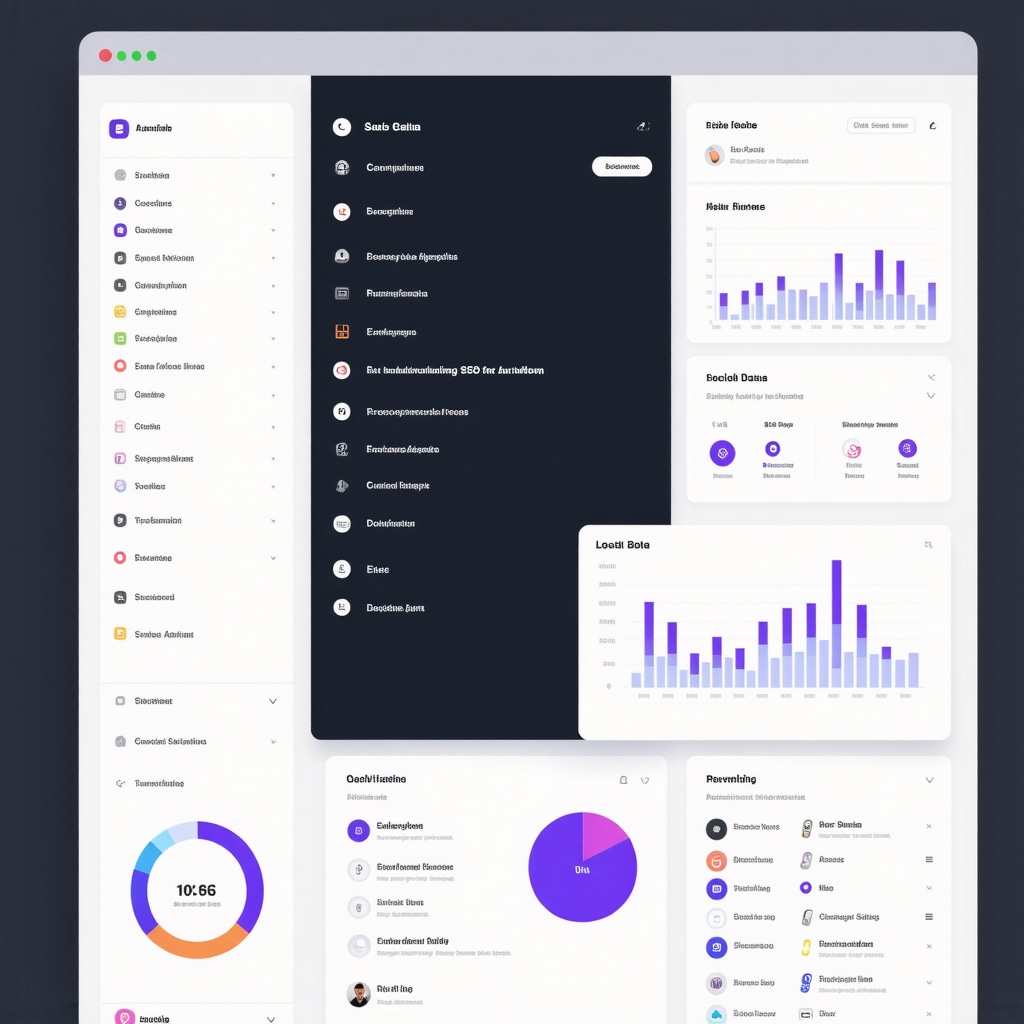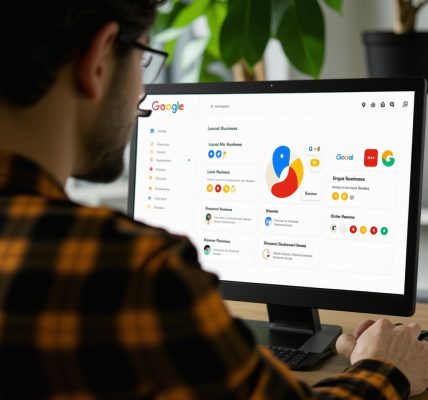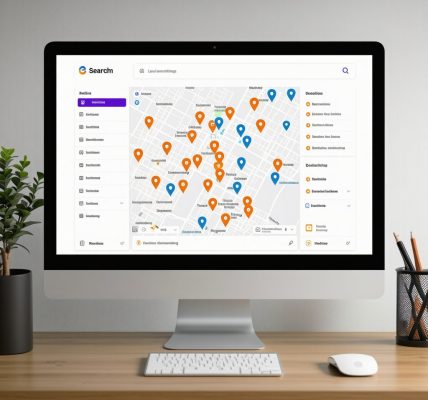Unlocking the Power of GMB Citations in Local SEO
In the fiercely competitive landscape of local search, mastering Google My Business (GMB) citations has become an indispensable strategy for businesses aiming to dominate their local markets. But what exactly makes a citation so pivotal in enhancing local rankings, and how can you manage it effectively to maximize your Google Business Profile’s visibility? This article dives deep into actionable insights and expert tactics that transform mere listings into powerful local signals driving organic growth.
Precision and Consistency: The Twin Pillars of Citation Management
At the heart of citation management lies the critical need for accuracy and uniformity. Each mention of your business’s Name, Address, and Phone number (NAP) across directories, review sites, and social platforms must be perfectly consistent. Discrepancies confuse search engines and undermine trust, impacting your GMB rankings negatively. An illustrative example is a local café whose address was listed with a street abbreviation in one directory but spelled out in another; this mismatch caused lower visibility in Google Maps results despite strong onsite SEO.
To combat this, deploying a systematic audit process is essential. Utilize tools like Moz Local or BrightLocal to scan your citation footprint for errors or duplicates. Regular monitoring and updates prevent decay and ensure all mentions reinforce your local SEO strength rather than dilute it.
Strategic Citation Building Beyond the Obvious
While mainstream directories like Yelp, YellowPages, and Foursquare are foundational, expert citation management emphasizes targeting industry-specific and hyperlocal platforms. For instance, a law firm would benefit greatly from listings on Avvo or Justia, while a neighborhood restaurant gains traction on local food blogs or community portals. These niche citations create contextually relevant backlinks and signals that Google perceives as authentic endorsements, enhancing your local relevance.
How do GMB citations interplay with other local SEO factors for ranking improvement?
Understanding the interplay between citations and other local SEO components is pivotal. GMB citations complement on-page optimization, genuine customer reviews, and geographic keyword targeting. For example, citations with consistent NAP details help reinforce your GMB listing’s legitimacy, which alongside positive reviews and optimized content, bolsters your ranking in the Local Pack and Google Maps. According to a study by Whitespark, citation signals remain a top local ranking factor, especially for businesses new to local SEO or those in competitive markets.
Leveraging Advanced Tools and Expert Services for Citation Excellence
Managing citations manually can be daunting; hence, many businesses turn to expert citation management services that provide ongoing optimization, monitoring, and cleanup. These services not only ensure consistency but also identify new citation opportunities aligned with evolving search algorithms.
Moreover, integrating citation management with broader GMB SEO strategies amplifies impact. Combining this with regular GMB profile optimization, review management, and local keyword research creates a synergy that propels local rankings faster and steadier. For those interested in a comprehensive approach, exploring effective GMB citation management strategies can provide invaluable guidance.
Call to Action
Ready to elevate your local SEO game? Share your experiences managing GMB citations or ask questions below to join a community of local SEO enthusiasts dedicated to mastering Google Business optimization.
For further expert insights, consider reading our detailed guide on expert GMB citation services that can streamline your path to local search dominance.
References:
Whitespark Local Search Ranking Factors Study
Integrating Citation Management with Local Content Strategy
Effective GMB citation management is not an isolated tactic; it thrives when synchronized with a robust local content strategy. Creating localized blog posts, event announcements, or customer stories that reference your citations can amplify the authority of your Google Business Profile. For instance, a landscaping business publishing guides on seasonal garden care while embedding location-specific keywords and linking back to their directory listings creates a rich ecosystem of local signals. This approach not only enhances citation value but also fosters user engagement and trust.
Navigating Citation Challenges: Duplicate Listings and Data Decay
One significant hurdle in citation management is the prevalence of duplicate listings and the natural decay of citation accuracy over time. Duplicate listings can fragment your business’s online presence, confusing search engines and customers alike. To mitigate this, employing advanced tools such as SEMrush’s Listing Management or Yext can facilitate the identification and removal of duplicates efficiently.
Data decay, the gradual shift or inaccuracy of business details due to changes like address relocation or phone number updates, requires vigilant monitoring. Establishing a quarterly audit routine ensures your citations reflect current information, preserving SEO equity and user experience. Additionally, automating alerts for changes across major directories helps maintain citation integrity proactively.
What emerging trends in citation management could redefine local SEO rankings?
Emerging trends in citation management are reshaping how local SEO experts approach rankings. The rise of voice search and AI-powered assistants emphasizes the need for hyper-accurate and semantically rich citations that voice recognition systems can easily interpret. Moreover, integrating structured data markup (Schema.org) with citation entries enhances search engines’ understanding of your business context, boosting local relevance.
Furthermore, the increasing importance of social proof means that citations combined with authentic user-generated content, such as reviews and photos, create a multi-dimensional local presence. Experts recommend leveraging AI tools to analyze citation impact continually and adapt strategies dynamically. These innovations signify a shift towards a more holistic, technology-driven citation ecosystem.
Leveraging Authoritative Insights to Refine Citation Strategies
According to Moz, a leader in SEO expertise, “Consistent citations are fundamental to local SEO success, but the quality and relevance of citation sources have gained paramount importance.” This insight underscores the necessity for businesses to prioritize niche and local citations over mere volume, aligning with Google’s evolving algorithmic preferences that reward contextual relevance and user experience.[Moz Local SEO Guide]
To capitalize on authoritative guidance, businesses should integrate citation audits with comprehensive local SEO audits, ensuring alignment across all digital assets. This integrated methodology enhances the credibility and discoverability of your Google Business Profile, positioning you for consistent ranking improvements.
Maximizing Citation Impact: Practical Tips for Continuous Improvement
For sustained citation excellence, adopt a cyclical approach encompassing discovery, optimization, and monitoring. Begin by identifying new citation opportunities through competitor analysis and industry research. Next, optimize each listing with enriched content—high-quality images, accurate NAP, and relevant categories. Finally, implement ongoing monitoring systems using tools like BrightLocal or Whitespark to track citation health and performance.
Such proactive citation stewardship not only safeguards your local SEO investment but also adapts to the dynamic nature of search algorithms. To deepen your expertise, explore our comprehensive resources on GMB citation management tips and advanced GMB optimization strategies.
Engage with the Community
Have you encountered unique challenges or success stories in managing your GMB citations? Share your insights or questions in the comments below to foster a knowledge exchange among local SEO professionals. Your experience could help others optimize their approach and collectively elevate local search standards.
Harnessing Advanced Citation Analytics: Unlocking Deeper Insights for GMB Optimization
Beyond simply building and maintaining citations, an expert-level approach involves leveraging advanced analytics to assess citation impact comprehensively. Citation analytics delve into not only the presence but also the quality, relevance, and influence of each citation on your Google Business Profile’s performance. By integrating data from platforms like Google Search Console, BrightLocal, and Whitespark, SEO professionals can unearth nuanced patterns such as which citations drive the most referral traffic, influence ranking fluctuations, or correlate with review engagement spikes.
For instance, tracking citation-driven referral traffic through UTM parameters embedded in directory listings can reveal high-converting sources, enabling more focused citation investment. Deep correlation analyses between citation volume versus ranking improvements across different geographic segments provide actionable intelligence to tailor localized strategies precisely.
How can machine learning enhance citation management to predict local SEO ranking shifts?
Machine learning (ML) applications represent the frontier in citation strategy evolution. By feeding historical citation data, ranking metrics, and user engagement signals into ML models, local SEO specialists can predict how future citation changes might influence rankings. These predictive insights facilitate proactive citation adjustments rather than reactive fixes, optimizing resource allocation and mitigating risks of ranking volatility.
Moreover, ML-powered tools can automate anomaly detection, flagging citation inconsistencies or suspicious duplicates before they impact SEO. The continuous learning capability of these systems ensures adaptation to Google’s ever-evolving local search algorithms, providing a competitive edge.
Integrating Structured Data Markup with Citation Profiles for Semantic SEO Dominance
Embedding structured data markup (Schema.org) within your website and citation profiles advances semantic SEO by explicitly communicating business attributes to search engines. Rich snippets generated from such markup increase click-through rates by enhancing the visibility of key information like business hours, reviews, geographic coordinates, and service areas directly within SERPs.
Implementing LocalBusiness schema with precise NAP details and linking these to authoritative citation sources creates a cohesive semantic network. This synergy not only boosts your GMB profile’s credibility but also aids voice search assistants in delivering accurate results, a growing segment of local queries.
According to a detailed analysis by Search Engine Journal, “Employing structured data on local business listings significantly improves search visibility and user engagement metrics, which Google increasingly factors into local ranking algorithms.”[Search Engine Journal]

Elevating Citation Quality with User-Generated Content and Social Signals
Integrating user-generated content (UGC) such as photos, reviews, and check-ins within citation profiles enriches the local SEO ecosystem. These authentic signals complement citations by adding layers of social proof and engagement, elements Google values highly when assessing local relevance and trustworthiness.
Encouraging customers to contribute UGC on citation platforms and linking this content back to your GMB profile amplifies authority and fosters a loyal community. Additionally, citations associated with active social media signals can benefit from increased crawl frequency and enhanced ranking signals.
Practical Steps for SEO Experts to Implement Advanced Citation Strategies
To operationalize these sophisticated tactics, SEO professionals should:
- Implement comprehensive citation tracking frameworks combining manual audits with automated analytics tools.
- Leverage machine learning platforms for predictive insights and anomaly detection.
- Adopt structured data markup across website and citation entries to enhance semantic clarity.
- Foster user engagement by integrating UGC and social signals into citation profiles.
- Continuously update citation strategies based on data-driven feedback loops and emerging industry trends.
Adopting this multi-dimensional approach transforms citation management from a routine task into a strategic pillar for local SEO excellence.
Join the Expert Conversation
How have you integrated advanced analytics or AI in managing your GMB citations? Share your experiences or questions below to connect with fellow local SEO experts pushing the boundaries of citation strategy.
Unveiling the Future: AI-Driven Citation Management for Local SEO Mastery
As local SEO evolves, the integration of artificial intelligence into citation management stands as a transformative frontier. AI algorithms now empower SEO professionals to analyze vast datasets with unprecedented precision, identifying citation gaps and predicting their impact on local ranking trajectories. This proactive foresight enables prioritization of high-impact citation opportunities tailored to nuanced market dynamics, outperforming traditional reactive methods.
Furthermore, AI-driven sentiment analysis applied to user-generated content within citation profiles offers nuanced insights into brand perception, enabling more strategic reputation management directly linked to citation quality. Embracing these technologies not only optimizes citation portfolios but also deepens understanding of consumer behavior at a granular level.
Semantic SEO Synergies: Elevating Local Signals through Advanced Schema Integration
Beyond basic structured data, deploying comprehensive Schema.org vocabularies—such as LocalBusiness, Service, and GeoCoordinates—across citation entries amplifies semantic richness. This meticulous semantic layering facilitates enhanced comprehension by search engines, allowing for more relevant and context-aware local search results.
Moreover, linking structured data from your website with external citations creates a robust semantic network that bolsters entity authority. This interconnected web of data not only improves visibility but also supports emerging technologies like voice assistants and augmented reality local guides, positioning your business at the technological forefront.
What are the best practices for integrating AI insights with structured data to maximize GMB citation effectiveness?
Optimal integration involves a cyclical process where AI-generated analytics identify citation discrepancies and content gaps, which are then addressed by enriching structured data elements accordingly. For example, if AI uncovers underrepresented service areas or inconsistent NAP data across platforms, updating Schema markup to reflect accurate and comprehensive information ensures semantic consistency.
Additionally, continuous AI monitoring can detect shifts in user search intent and emerging local trends, prompting timely schema adjustments that align citation profiles with current market demands. This dynamic synergy fosters a resilient, adaptive citation strategy that drives sustained GMB prominence.
Authoritative Perspectives: Insights from Industry Leaders
According to a detailed report by BrightLocal, AI integration in local SEO is rapidly becoming indispensable, with advanced analytics and automation dramatically enhancing citation accuracy and strategic decision-making. Their research highlights that businesses leveraging AI-driven citation management experience measurable improvements in local visibility and user engagement metrics.
Engage with Cutting-Edge GMB Citation Techniques Today
Are you ready to harness AI-powered analytics and semantic markup to elevate your GMB citation strategy beyond conventional boundaries? Connect with our expert community by sharing your experiences or queries below, and access tailored insights designed to position your business at the apex of local search innovation.
Frequently Asked Questions (FAQ)
What exactly are Google My Business (GMB) citations and why do they matter for local SEO?
GMB citations refer to any online mention of your business’s Name, Address, and Phone number (NAP) across various platforms, including directories, social media, and niche sites. They serve as critical trust signals to search engines, validating your business’s existence and location. Consistent and authoritative citations boost your Google Business Profile’s credibility, significantly influencing local search rankings.
How can I ensure citation consistency across different directories and platforms?
Maintaining uniform NAP data is paramount. Conduct regular audits using tools like Moz Local, BrightLocal, or SEMrush Listing Management to detect inconsistencies or duplicates. Establish a single, authoritative source for your business information and update all citations promptly when changes occur to prevent data decay and ranking penalties.
Are industry-specific and hyperlocal citations more valuable than general directories?
Yes, niche and hyperlocal citations provide contextual relevance that general directories may lack. Listings on platforms tailored to your industry or local community enhance your business’s topical authority and improve Google’s perception of your local relevance, thereby offering a stronger ranking advantage than generic listings alone.
How do structured data markups (Schema.org) enhance citation effectiveness?
Structured data markup explicitly communicates your business details to search engines in a machine-readable format, improving semantic understanding. Applying LocalBusiness schema with accurate NAP, service areas, and reviews helps generate rich snippets in search results, increases visibility, and facilitates accurate voice search responses, thus amplifying the impact of your citations.
What role does user-generated content (UGC) play in citation management?
UGC such as reviews, photos, and check-ins enrich citation profiles by adding authentic social proof and engagement signals. This multi-dimensional presence increases trustworthiness and local relevance, which Google values highly. Actively encouraging and integrating UGC can substantially elevate your Google Business Profile authority and rankings.
How can AI and machine learning improve citation management strategies?
AI-powered tools analyze vast datasets to identify citation gaps, predict ranking impacts, and detect anomalies like duplicates or inconsistencies proactively. Machine learning models enable predictive adjustments to citation portfolios, optimizing resource allocation and adapting strategies dynamically in line with evolving search algorithms for sustained local SEO performance.
What challenges should I anticipate when managing citations at scale?
Common challenges include duplicate listings, data decay due to business changes, and difficulty maintaining consistency across numerous platforms. To overcome these, implement automated monitoring, schedule regular audits, and use advanced citation management services or tools that streamline updates and ensure data integrity across all listings.
How do citations interplay with other local SEO factors like reviews and on-page SEO?
Citations reinforce your business legitimacy while reviews contribute social proof and on-page SEO enhances content relevance. Together, they create a comprehensive local SEO ecosystem. Consistent citations support your Google Business Profile’s authority, while positive reviews and optimized site content synergize to elevate rankings in local packs and maps.
What emerging trends in citation management should businesses prepare for?
Emerging trends include the integration of AI-driven analytics, the growing importance of structured semantic markup, voice search optimization, and the increasing role of social signals combined with citations. Preparing for these shifts by adopting advanced tools and holistic strategies will keep your local SEO efforts competitive and future-proof.
How often should I audit and update my citations for optimal local SEO?
Ideally, conduct citation audits at least quarterly to identify and correct inaccuracies, duplicates, or outdated information. Frequent updates are crucial following any business changes such as relocation or phone number updates. Continuous monitoring with automated alerts ensures your citations remain accurate and effective in supporting your GMB rankings.
Trusted External Sources
- Whitespark Local Search Ranking Factors Study – Provides comprehensive, data-driven insights into the influence of citation signals and other ranking factors in local SEO, guiding effective citation prioritization.
- Moz Local SEO Guide – Offers authoritative expertise on citation consistency, quality, and strategic building, emphasizing the importance of niche and local relevance.
- BrightLocal Research on AI in Local SEO – Examines the transformative role of artificial intelligence and advanced analytics in enhancing citation management accuracy and decision-making.
- Search Engine Journal’s Structured Data in Local SEO Analysis – Details best practices for implementing Schema.org markup to boost local business visibility and semantic SEO performance.
- SEMrush Listing Management Tool Documentation – Provides practical guidance on identifying, consolidating, and maintaining citations, particularly for large-scale or complex local SEO operations.
Conclusion
Mastering Google My Business citation management is a cornerstone of robust local SEO strategies. Through meticulous citation consistency, strategic targeting of industry-specific and hyperlocal platforms, and the integration of advanced technologies like AI and structured data markup, businesses can significantly enhance their Google Business Profile’s authority and visibility. Incorporating user-generated content and leveraging sophisticated analytics transforms citation management from a routine task into a dynamic, data-driven practice that aligns with evolving search engine algorithms. By embracing these expert strategies, businesses position themselves to achieve sustained local search dominance, improved user engagement, and measurable growth. Engage with this knowledge by sharing your experiences, exploring advanced citation tools, and continuously refining your approach to unlock the full potential of your local SEO efforts.





I found the emphasis on precision and consistency in GMB citations particularly resonant with my recent experiences managing a local boutique. Discrepancies in the business name or address across platforms have a surprisingly strong negative impact on visibility, sometimes more than anticipated. Using tools like BrightLocal has saved considerable time, but the challenge remains in maintaining uniformity when dealing with dynamic changes such as new locations or updated contact info. The article also highlighted the power of targeting niche and hyperlocal directories, which I believe is often underestimated. For example, we recently listed on a localized arts directory, and it noticeably improved traffic quality, not just volume.
One aspect I’m curious about is how others balance the integration of user-generated content with citation management. Encouraging authentic reviews and photos can enhance the listing’s credibility, but it’s sometimes difficult to coordinate alongside citation audits and updates. Has anyone developed effective workflows or tools that merge citation consistency efforts with active user engagement to create a cohesive local SEO strategy? I’d love to hear what has worked for others in streamlining these interconnected tasks while maximizing local rankings.